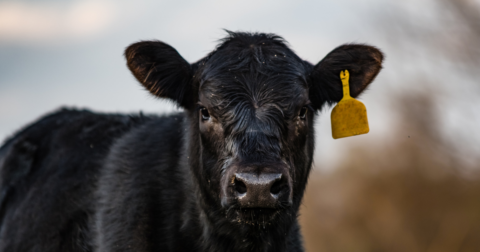Investigation
What Does a Small Town Do When the Water Is Undrinkable?
Climate•8 min read
Reported
New study highlights the outsized impact of swapping out a third of all meat with plant-based alternatives.


Words by Grace Hussain
A new report from analysts at Perfundo finds that replacing 30 percent of meat with plant-based foods would yield massive savings in water, land and greenhouse gas pollution — enough to offset almost all of the emissions from airline flights.
Commissioned by non-profit Madre Brava, the analysis focused solely on regions responsible for massive overconsumption of meat — for example, North and South America and Europe. They found the switch would save around 7.5 million Olympic-size swimming pools worth of water and 728 million metric tons of carbon equivalent emissions. Plus, shifting to a more plant-rich diet would free up an India-sized chunk of land from animal agriculture so that it could be rewilded, a move that would store carbon rather than release it into the atmosphere.
Beginning in 2006 when the UN’s Food and Agriculture Organization published a groundbreaking report called Livestock’s Long Shadow, a growing body of research has found that meat, especially beef, and dairy foods are a massive source of climate pollution — around 14 percent of all greenhouse gas emissions, and even more by some estimates.
The reason beef and dairy are so climate-intensive is that cows belch a lot of methane, and require a lot of land to raise, whether it’s pasture or cropland used to grow feed crops. Raising animals for food uses up far more natural resources than plant-based proteins like beans and legumes. For instance, even though 77 percent of all farmland is used for livestock — whether for them to live on or to grow corn and soy for them to eat — animal-based foods provide only 18 percent of the world’s calories. In contrast, the new report finds that converting land from supporting meat production to growing human-edible sources of plant protein results in 14 times more protein available to feed the world’s growing population, predicted to reach more than 9 billion by 2030.
Global meat consumption has been on the rise for several decades but research shows some countries continue to eat far more than others.
According to the report, the average European eats 1.4 kilograms of meat every week, significantly more than the global average — yet some countries have managed to curb their intake. In Germany, for example, 2022 marked a year of historically low meat consumption, with Germans eating an average of 1 kilogram a week per person.
And while Ethiopians, for instance, eat less than 1 kilogram of chicken each year, eaters in the U.S. eat a whopping 58 kilograms in that same time span. Meanwhile in Brazil, another top consumer, the average consumer eats just over 48 kilograms of poultry a year.
Overconsumption in Europe, the U.S. and Brazil is driving environmental degradation but the flipside is these countries have the biggest opportunity to make an environmental impact through small but important dietary changes.
“Going meat-free two days a week will have huge environmental benefits,” said Nico Muzi, a representative of Madre Brava, in a press release.
A 30 percent reduction would save 7.5 million Olympic-size swimming pools worth of water, offset virtually all of the aviation industry’s emissions and even free up 3.4 million square kilometers of farmland — an area roughly equivalent to the size of India. The move would also spare 100 million cows, 420 million pigs and 22 chickens per year, says the report.
Despite the evidence favoring a transition away from factory farms, policymakers have been slow to make any changes to their food systems.
In the U.S., for instance, more than $50 billion goes toward direct subsidies for animal agriculture while only half of that — $24.69 billion — goes to farmers growing plants for human consumption. Globally, the UN estimates that governments give $540 billion yearly to agriculture in the form of financial support programs like subsidies.
Muzi is calling on lawmakers to align their food systems policies with climate science. “Meat is a very inefficient way of producing cheap unsustainable proteins for a growing world population,” he said in the press release. “For food security reasons, world leaders should be looking at boosting the production of protein crops and reducing the production of beef.”